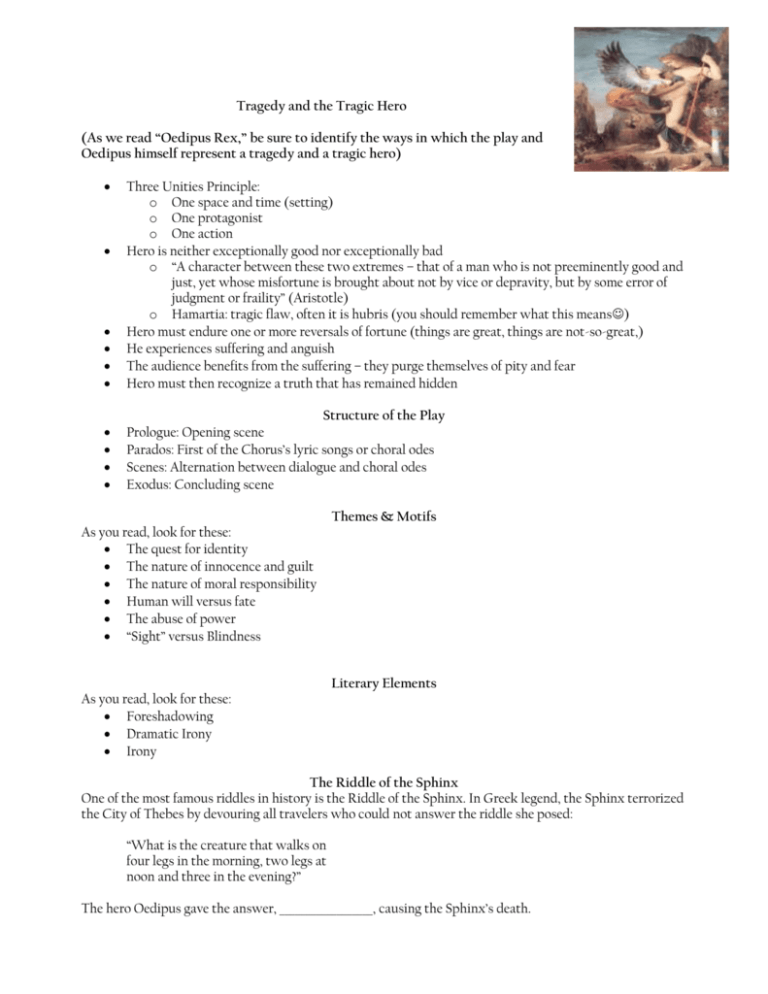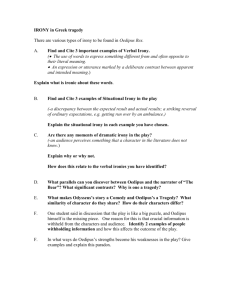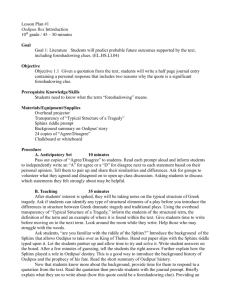Tragedy and the Tragic Hero
advertisement

Tragedy and the Tragic Hero (As we read “Oedipus Rex,” be sure to identify the ways in which the play and Oedipus himself represent a tragedy and a tragic hero) Three Unities Principle: o One space and time (setting) o One protagonist o One action Hero is neither exceptionally good nor exceptionally bad o “A character between these two extremes – that of a man who is not preeminently good and just, yet whose misfortune is brought about not by vice or depravity, but by some error of judgment or fraility” (Aristotle) o Hamartia: tragic flaw, often it is hubris (you should remember what this means) Hero must endure one or more reversals of fortune (things are great, things are not-so-great,) He experiences suffering and anguish The audience benefits from the suffering – they purge themselves of pity and fear Hero must then recognize a truth that has remained hidden Structure of the Play Prologue: Opening scene Parados: First of the Chorus’s lyric songs or choral odes Scenes: Alternation between dialogue and choral odes Exodus: Concluding scene As you read, look for these: The quest for identity The nature of innocence and guilt The nature of moral responsibility Human will versus fate The abuse of power “Sight” versus Blindness As you read, look for these: Foreshadowing Dramatic Irony Irony Themes & Motifs Literary Elements The Riddle of the Sphinx One of the most famous riddles in history is the Riddle of the Sphinx. In Greek legend, the Sphinx terrorized the City of Thebes by devouring all travelers who could not answer the riddle she posed: “What is the creature that walks on four legs in the morning, two legs at noon and three in the evening?” The hero Oedipus gave the answer, __________________, causing the Sphinx’s death. Vocabulary Scene 1 Clairvoyant/divination: able to see into the future, predict events Highwaymen: a holdup man, usually on horseback, Pestilence: deadly epidemic or virus Proclamation: a public and official announcement Prudent: wise Insolence: disrespect Infamy: bad reputation Read the following lines and then explain why it is ironic. Oedipus: Now I, Having the power that he held before me Having his bed, begetting his children there Upon his wife, as he would have, had he livedTheir son would have been my children’s brother, If Laius had had luck in fatherhood! I say I take the son’s part, to press the fight for him And see it won! Irony explanation: As the audience, what is your reaction to this “proclamation” by Oedipus? Describe the contrast between sight and blindness in this scene. Scene 2 Indiscretion: carelessness, lack of judgment (antonym of prudent) Brazen: Bold, daring Treasonable: rebellious, disloyal Anarchy: lawlessness, chaos Duplicity: deceit, deception Parry: escape, side-step Incarnate: alive, embodied Din: noise, disturbance Tumult: uproar, chaos, Edict: an official announcement Foreboding: threatening, ominous Hearsay: rumor, gossip Soothsayer: fortune teller, one who “sees” into the future Malediction: a curse Read the following lines, then discuss how they are an example of foreshadowing: Oedipus: How strange a shadowy memory crossed my mind, Just now while you were speaking; it chilled my heart. Explanation of foreshadowing: Oedipus recounts what the oracle told him of his fate, and says that, upon learning of it: “As, that I should lie with my own mother, breed Children from whom all men would turn their eyes; And that I should be my father’s murderer. I heard all this, and fled” Discuss the irony in these lines: Scenes 3 & 4 Suppliant: pleading, beggins Overwrought: disturbed, upset, Defilement: ruining, tarnishing, dirtying Oracle: one who can “see” or predict the future Baseness: common, lowly Sirings: fathering Read the following lines, then respond to the prompts below. “Ah God! It was true! All the prophecies -Now, O Light, may I look on you for the last time! I, Oedipus, Oedipus, damned in his birth, in his marriage damned Damned in the blood he shed with is own hand!: How do these lines portray Oedipus as a tragic hero? Which stage of the tragedy do these lines depict? Exodus Venerate: worship, adore Execrable: repulsive, abominable Engendered: to produce, procreate, bring into existence Reproach: scold, blame, accuse Parricide: the murder of one’s father Bane: nuisance, pest Why is it symbolic that Oedipus blinds himself? Discuss the motif of sight/blindness.









